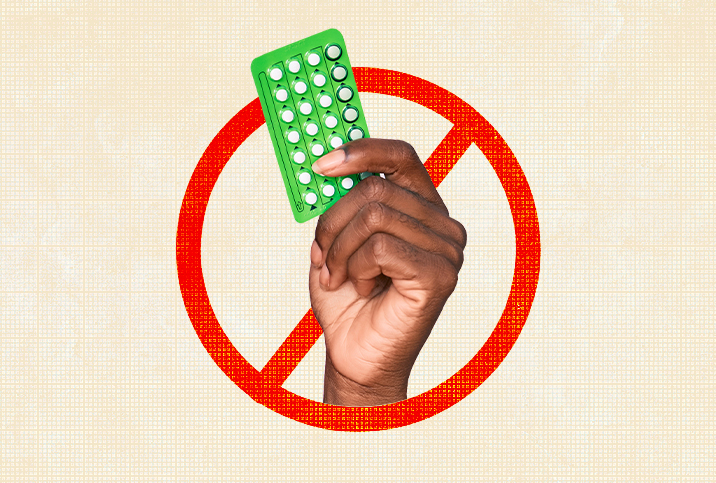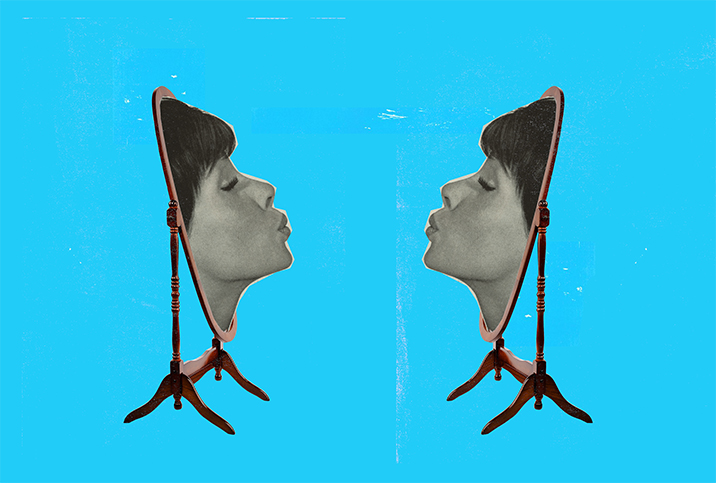When Going Off Birth Control Makes Your Partner Unattractive

When I went off the birth control pill after being on it for over a decade, it took some time for me to notice the change in my sexual attunement. One of the first hints that my attraction may have been shifting was when a muscular "bro" type walked by me on the street and my body was instinctively drawn to him.
Even though I was walking the other direction to meet a friend, I turned around and trailed him for a moment. He was chatting on the phone, loudly shouting to the person on the other end (red flag one), and as he passed by his reflection in a shop window, I swear he flexed (red flag two). After my phone buzzed and I saw a message from my friend asking me where I was, I bid adieu to my frat-bro-hypermasculine crush and went on with my day. But this was one of the first times in years I'd felt a strong, almost primal response to a man with whom I had no interest in talking.
The majority of the research I referenced in my journey to learn more was focused on straight women. While we can, hopefully, learn more in the future about the pill's impact on folks of all identities, today we'll focus chiefly on women in straight relationships.
Birth control, feelings and attraction
Naturally cycling folks experience shifts in their sexual attunement that peak during the high-fertility phase of the month, around ovulation. During ovulation, these people tend to shift their attraction to more traditionally masculine features (hello, bros!), have more sexual energy overall and are more inclined to cheat on their partners with those masculine types, according to one small 2006 study.
Birth control stops your natural cycle and fools your body into thinking you are pregnant so you don't get pregnant. Folks on the pill never experience ovulation, so they may be less in tune to the spikes and changes in attraction that ovulation brings.
It seems birth control can change your attraction.
Your ability to sniff out partners' changes
Straight women tend to be naturally drawn to partners who are genetically distinct from them and who have traditionally masculine features. Sarah Hill, Ph.D., the Texas-based author of "This Is Your Brain on Birth Control," explained how these innate preferences may change on birth control.
"Women on the pill do not appear to discriminate between men whose immune genes are similar versus dissimilar to their own the way naturally cycling women do," Hill said. "Although naturally cycling women prefer the scent of men whose immune genes are different than their own, women on the pill lack this preference."
'When it comes to women whose attraction to their partner changes after birth control cessation [...] women presumably chose a partner who they no longer find to be compatible with their naturally occurring levels of sex hormones and partner preferences.'
There is an evolutionary benefit to being able to sniff out this difference, as making babies with men who have a different genetic makeup decreases the chances of miscarriage and instead increases the chances of a healthy baby.
Women who are not on the pill tend to be more attracted to genetically similar men. Perhaps when your body thinks you are pregnant, you begin to search for a supportive family figure to help out since your body believes you have already scored the solid sperm.
Indeed, many people on birth control show a weaker preference for traditionally masculine features. For example, according to a 2012 study published in the Royal Society's flagship biological research journal, Proceedings B, women on hormonal birth control were more likely to select financially stable and intelligent partners. However, folks who picked their partners when they were not on the pill were more likely to express higher attraction and sexual satisfaction in their relationship.
A change in attraction
When you go off the birth control pill, your ovulation-based attunement slowly reawakens and your ability to sense good genetic matches returns. As a result, the effect of going off the pill on your relationship depends on the objective attractiveness of your partner.
Studies indicate that women who have husbands with traditionally attractive faces have increased marital satisfaction when going off the birth control pill. However, women whose partners have less attractive faces have decreased marital satisfaction once they stop the pill. It's almost as if going off the pill opened women's eyes to their genetic compatibility with their partner, and its effect depended on whether they happened to make an evolutionarily adaptive choice or not.
When it comes to women whose attraction to their partner changes after birth control cessation, Hill said these women presumably chose a partner who they no longer find to be compatible with their naturally occurring levels of sex hormones and partner preferences.
If you just can't keep the relationship going after stopping the pill, you can always tell your ex, "It's not you—it's my naturally occurring levels of sex hormones."
You may be more likely to show interest in other partners
One 2019 study published in Evolutionary Psychological Science took this investigation a step further, exploring whether people who met their partner while on the birth control pill and then stopped taking the pill were more interested in alternative mates than other groups. Indeed, partnered women who recently went off the pill and were currently in the high-fertility part of their cycle were the most likely to think sexual thoughts about an alternative mate. Shaking up our birth control methods mid-relationship and the changes in compatibility that might bring are worth deliberating.
For some people, changing birth control methods while in a relationship can be the right move, but we still don't have all the facts to make informed choices about its potential effect.
"To be honest, I don't think people are given enough information about anything in medicine," said Evelin Dacker, M.D., an integrative sexual medicine physician in Oregon. "We doctors often cut to the chase: Birth control works in preventing pregnancy. But we don't often get into the details."
If you switch birth control methods during a relationship, it is imperative to get educated about its possible effects and communicate with partners about changes in desire and attraction to meet any potential challenges head-on.


















